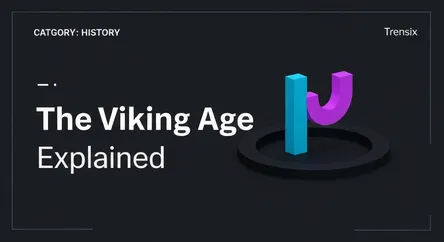History
The Viking Age Explained

An introduction to the Viking Age (c. 793-1066 AD), exploring the Norsemen's impact as raiders, traders, and explorers on world history.
What is it?
The Viking Age was a period in European history from the late 8th to the late 11th centuries. It is characterized by the widespread raiding, colonizing, trading, and settlement by Norsemen, commonly known as Vikings, from their Scandinavian homelands of Denmark, Norway, and Sweden. Conventionally, the era is marked as beginning with the raid on Lindisfarne monastery in England in 793 AD and ending with the defeat of the Norwegian king Harald Hardrada at the Battle of Stamford Bridge in 1066. These seafaring people used their advanced longships to travel as far as North America, the Middle East, and North Africa, establishing settlements and trade routes across a vast area.
Why is it trending?
The Viking Age has seen a surge in popular interest, largely driven by its depiction in modern media. TV series, films, and video games have romanticized Vikings as fierce warriors and intrepid explorers, capturing the public's imagination. This portrayal, combined with a fascination for Norse mythology—featuring gods like Odin and Thor—has created a strong cultural appeal. Furthermore, the Viking spirit of adventure and their complex society, which included skilled craftspeople and traders, offers a compelling alternative to more familiar historical narratives.
How does it affect people?
The legacy of the Viking Age is deeply embedded in modern culture, language, and politics. Many English words, such as "sky," "leg," and "window," are derived from the Old Norse language of the Vikings. They founded cities that remain important today, including Dublin in Ireland. Their settlements and political influence were profound, leading to the establishment of Normandy in France and the Danelaw in England, which shaped the development of these nations. Viking explorers were also the first Europeans to reach North America, nearly 500 years before Columbus.